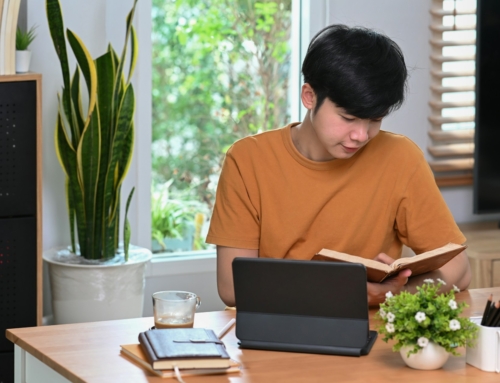Have you ever found yourself feeling stuck, repeating the same thoughts, and working through the same scenarios over and over in your mind? Sometimes our minds can feel like they’re running in place. You might be sitting in a meeting, trying to get some sleep, or at your child’s school play and find yourself caught in a cycle of negative, anxious thoughts. Anxiety can leave you feeling stuck.
Anxiety can take over your life. Sometimes those anxious thoughts are rooted in the problems you’re currently facing. However, you might also find yourself feeling anxious over things that haven’t happened or only have a small possibility of occurring. That doesn’t diminish the negative effect anxiety might have on you, making it all the more important to know how to keep anxiety in check.
Why We Get Anxious
 Anxiety is a natural response to situations that seem uncertain or threatening. This is a necessary response mechanism in a world with poisonous reptiles, wild animals, or reckless drivers. When you feel anxious, the fear center in your brain is activated. This causes all sorts of changes in your body, including giving you more energy and causing your heart rate to increase.
Anxiety is a natural response to situations that seem uncertain or threatening. This is a necessary response mechanism in a world with poisonous reptiles, wild animals, or reckless drivers. When you feel anxious, the fear center in your brain is activated. This causes all sorts of changes in your body, including giving you more energy and causing your heart rate to increase.
The stress response generated has a real purpose in safeguarding our well-being. However, anxiety is meant to function in the short-term and for threatening situations. When anxiety is either easily triggered or lingers for long periods of time, it can begin to undermine physical, emotional, and mental health. The body’s alarm system is meant to be “on” every so often – and for emergencies – not all the time.
People feel anxious as a result of real or perceived threats, but several factors influence whether and how a person perceives the world around them. Through a combination of environmental and genetic factors, some people may be more prone to anxiety than others. Being anxious may also be a learned behavior. When anxiety is overwhelming and present, more often than not, it’s likely to become an anxiety disorder.
There are different kinds of anxiety disorders. With generalized anxiety disorder, a person is persistently worried about everyday things. A person suffering from social anxiety disorder is afraid of social situations or of being judged or embarrassed in public. Lastly, obsessive-compulsive disorder (OCD) describes intrusive and recurring thoughts which are often accompanied by compulsions relieved by specific rituals to feel calm.
You may find that your anxiety feels overwhelming, you can’t get it under control, it interferes with everyday activities, and it prevents you from living the life you’d like to live. If that’s the case, you should speak to a doctor or a mental health professional to receive a diagnosis and treatment for your anxiety. Anxiety can be brought under control through a variety of interventions.
How Anxiety Affects You
When you feel anxious, it can sometimes feel like your own mind is at war with you. You don’t want to think certain thoughts, and you’d rather your mind was calm and quiet, but the reel keeps running in your head. A person may be constantly anxious about certain things, like their health, but they can also be anxious about everyday things like insects, being out in public, or being separated from loved ones.
Depending on what makes a person anxious, how intense that anxiety is, and how long they feel anxious, the effect of anxiety will vary. Anxiety may impact your relationships, your work, your sense of peace, and your physical well-being. You may find yourself struggling to relax or calm down, and you may also become irritable. Anxiety may leave you feeling afraid and worried all the time.
Physically, when anxiety triggers your stress response, it results in changes and symptoms such as:
- Headaches and migraines.
- Chronic pain.
- Sleep disturbances such as struggling to fall asleep or staying asleep.
- Nausea and abdominal discomfort.
- Heart palpitations and a rapid heartbeat that can feel physically uncomfortable.
- Trembling, muscle tension, and excessive sweating.
Anxiety affects you in other ways, too. When you’re anxious, you can be prone to forgetfulness and lapses in your memory, which compounds social anxiety if one has it. Anxiety can also leave you feeling disorganized and confused, and you may struggle to concentrate on what you’re supposed to be doing. Anxiety can disrupt your thoughts and often results in difficulty making decisions.
 If you’re anxious in particular settings, you may find yourself compensating for it by avoiding them. You may believe that if you avoid them, you won’t be anxious, but typically the result is that your anxiety intensifies. Therefore, if you feel uncomfortable in crowds or social situations, avoiding these might only result in feeling even more anxious if you find yourself in such a situation.
If you’re anxious in particular settings, you may find yourself compensating for it by avoiding them. You may believe that if you avoid them, you won’t be anxious, but typically the result is that your anxiety intensifies. Therefore, if you feel uncomfortable in crowds or social situations, avoiding these might only result in feeling even more anxious if you find yourself in such a situation.
A person’s anxiety may lead them toward unintended conflict with loved ones. If one’s anxiety promotes overdependence or clinginess, that could frustrate loved ones who must constantly give reassurances of their love. Anxiety can distort perceptions, leading to misunderstandings. Being anxious can also trigger defensiveness and emotional reactivity, which can spark or intensify conflict in relationships.
Another social or relational effect of anxiety is that it might result in difficulty forming and maintaining relationships. Apart from bringing conflict, anxiety – even when it’s not social anxiety – can result in social withdrawal. It can feel uncomfortable being anxious, and the symptoms of anxiety such as sweating or trembling might make a person self-conscious. This can contribute to difficulties in making and maintaining relationships with others.
If anxiety affects a person emotionally, mentally, and relationally, this will flow into everyday experiences. Disrupted focus and decision-making may impair school or work performance. The effects of anxiety can make managing daily tasks harder, increase daily stress, and make it harder to enjoy hobbies and other activities.
What to Do When You Feel Anxious
Anxiety affects us in so many different ways. Your response to anxiety may make it worse or better help you to cope with it. If you lean into avoidance behaviors, for instance, that might result in worsening the anxiety. It’s possible to also lean into self-sabotaging behaviors like substance abuse, perfectionism, binge eating, or overexercising to cope.
When you’re feeling anxious, there are several healthy ways to counter it. These include:
Disrupting anxious thoughts
Anxious thoughts can become stuck in your mind and keep you in a loop. The idea of taking every thought captive comes from 2 Corinthians 10:5 where Paul is talking about demolishing strongholds and everything that sets itself up against the knowledge of God. Anxious thoughts need to be disrupted with the truth about God and trust in God’s sovereignty, goodness, faithfulness, and mercy.
We destroy every proud obstacle that keeps people from knowing God. We capture their rebellious thoughts and teach them to obey Christ. – 2 Corinthians 10:5, NLT
Anxiety is complex, but whatever the reasons for it, it’s important to disrupt and challenge your anxious thoughts by challenging any catastrophic thinking or distortions of reality.
Some helpful strategies for disrupting anxious thoughts include:
Thought-stopping
 Notice that you are having a thought that causes anxiety. Choose a way to communicate to yourself to STOP this thought. You might say “Stop!” out loud or in your mind; picture a bright red stop sign; imagine yourself putting your hand out in a “halt” position; or give your head a quick shake as though you are shaking off the thought.
Notice that you are having a thought that causes anxiety. Choose a way to communicate to yourself to STOP this thought. You might say “Stop!” out loud or in your mind; picture a bright red stop sign; imagine yourself putting your hand out in a “halt” position; or give your head a quick shake as though you are shaking off the thought.
Then, exchange the anxious thought for a peaceful thought. You might plan your peaceful thought ahead of time. Lastly, you might choose to say your peaceful thought out loud or in your mind. Finally, keep your mind focused on the peaceful thought until the anxious one is gone.
Challenge the anxious thought
You might ask yourself some or all of the following: “What evidence do I have that this fear might or might not happen or come true? How can I reframe this thought so that it is more helpful or accurate? Will I cope if my fear or thought came true? How have I coped in the past? What would I say to a friend who was having these thoughts? What is most likely to occur? Am I falling into a thinking trap? How can I get out of it?”
Self-care
Anxiety can be triggered by consuming certain foods like coffee, and cutting down your consumption can help. Take care of what you eat, whether you’re getting enough sleep and regular exercise, and take time to rest and enjoy your favorite activities. Self-care goes a long way in creating capacity for emotional self-regulation and promoting overall well-being.
Sharing with others
If you have a social support system of loved ones, use it. Talk about what you’re experiencing with other people. Others can help you with perspective. They can also support you when you need to safely withdraw from a situation or to confront something in your life that’s anxiety-inducing.
Relaxation techniques
Whether through deep breathing, visualization, prayer, meditation or techniques like progressive muscle relaxation, you might calm yourself in moments when anxiety hits you.
“I am leaving you with a gift – peace of mind and heart. And the peace I give is a gift the world cannot give. So don’t be troubled or afraid.” – John 14:27, NLT
Further Steps for Handling Anxious Thoughts
 There are many reasons why people feel anxious, and it affects each person uniquely. If you feel anxious, or anxiety has overtaken your life, you can explore – and work to resolve – the roots of your anxiety by talking with a counselor. Your counselor may help you learn coping mechanisms that effectively reduce anxiety and allow you to function in daily life. They might also help you understand your anxiety better.
There are many reasons why people feel anxious, and it affects each person uniquely. If you feel anxious, or anxiety has overtaken your life, you can explore – and work to resolve – the roots of your anxiety by talking with a counselor. Your counselor may help you learn coping mechanisms that effectively reduce anxiety and allow you to function in daily life. They might also help you understand your anxiety better.
Beyond self-help techniques, your counselor or therapist can put together a treatment plan for your specific needs. This plan might include therapy as well as medication to help reduce the symptoms of anxiety.
An effective treatment plan can reduce anxiety and its impact on your life. If you want to reclaim your life and minimize the role of anxious thoughts in your day-to-day activities, reach out to our offices today. We will set up an appointment for you with a counselor specializing in anxiety.
“Down”, Courtesy of Liza Summer, Pexels.com, CC0 License; “Woman with Headphones”, Courtesy of Frank Flores, Unsplash.com, Unsplash+ License; “Thoughts”, Courtesy of Vie Studio, Pexels.com, CC0 License; “Journaling”, Courtesy of lil artsy, Pexels.com, CC0 License









